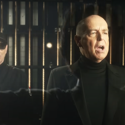Raised in London and living in New York, Kirsten Price and her soulful voice seem poised to take the independent music scene by storm. Above you see the brand spanking new video for Price’s “Freedom”.
We recently dispatched editor Andrew Belonsky to chat with Price about this video, her unquantifiable influences and why people need to stop talking “gay”.
AB: How are you? I just watched the “Freedom” video. It’s very good!
KP: I’m glad you like it. I did it myself. Actually, I got my first ever video camera as a gift from my father and I had never used a camera before, but I figured I’d have some fun with it.
AB: Where did you get the footage?
KP: There’s two shows – the actual live footage: one is from a performance I did at Mo Pitkins in New York and the other one is at the Highline Ballroom last month supporting the Groove Collective. Then I went to Coney Island to shoot the bumper cars and roller coasters. And I went over the Brooklyn Bridge on my bicycle – it’s really hard to hold the camera steady and look off the bridge while you’re pedaling.
How about we take this to the next level?
Our newsletter is like a refreshing cocktail (or mocktail) of LGBTQ+ entertainment and pop culture, served up with a side of eye-candy.
AB: It’s nice to hear a musician who is using her platform to – “Freedom” is a call to action and it’s also asking people to live their lives as openly as freely as possible. Right?
KP: We’re in an interesting time in American culture where we’ve earned – our generation, the generation before us – a certain amount of freedom in who we are and how we live our lives. We’ve combated slavery, fought for all kinds of civil liberties – we’re at a point now where prejudice against gay people exists as the last “respectable” prejudice. We’ve made all this progress and now we’re at a point where history and politics is going through a really odd stage. I felt the need to question the muscle of freedom – the idea that if we don’t use it, we lose it. I didn’t want to be angry or preachy, but it’s definitely question mark. What are we going to do with this enormous liberty that we’ve earned and continue to push for? What are they worth to us? What do we do with it?
AB: On your MySpace page is says you “sound like” “Kirsten Price” and you’re influenced by “Kirsten Price”. Aren’t you cheeky! Who are your influences?
KP: Maybe that was a little narcissistic! I sang in a lot of choirs as a kid – gospel choirs, I sang in medieval choirs. My education in music was from singing in lots of different choral groups. I listened to a lot of classical music, romantic. The vocal thing: I luckily have a vocal tone that’s recognizable and difficult to emulate. My music is genre bending – it’s not very traditional.
We have very strict roles that different cultural groups play in music. We have rock, we have gospel and we have all these boxes that we’re put in. Since [my] music sort of has a life, an identity, of its own. I didn’t really know where to put it, so I just put my name on it. I didn’t know what I was referencing. Vocally, I guess I reference the time when – can I call it the secularization of gospel music – when people just started reaching for notes and bending them: the type of thing that Aretha Franklin would do or Ray Charles would do: not that I’m anything like that, but that’s the kind of way I emote.
AB: It’s interesting that you say you didn’t know where to put your music. I was one of the millions of people and watched and cringed during the MTV music awards. I’m not sure if you –
KP: You know what, I didn’t watch. The mainstream music industry, the mainstream labels – it’s a slippery slope just in terms of financial survival. I don’t pay too much attention to the product.
AB: One of the things that I noticed watching that is – not necessarily a merger, but more collaboration – between rock and hip-hop and gospel… Those boxes aren’t as clearly defined as they –
KP: It’s great! I also think a lot of artists are forced into collaborations just in terms of guaranteeing coverage. A lot of labels make label mates do things together. While to an artist that may be a necessary evil, but it is producing interesting things.
AB: So, whom are you listening to right now?
KP: Oh, that’s a tough one. Here’s my dirty little secret: I don’t. I end up listening to whatever is pumped into me in retail stores, in gyms, friend’s cars – but in terms of active listening, the kind of listening we do when we’re teenagers, when we’re sit alone in a room and really absorb it… I can’t do that since I’ve been obsessively creating my own music, but I should be listening more…
AB: I know you don’t want to discuss being gay, but –
KP: It’s so boring.
AB: It doesn’t need to be discussed, obviously, but we have a lot of stars out there that do happen to be gay, but don’t discuss it… There are two perspectives: the more you discuss it, the more it becomes an issue that leads to backlash, etc. Of course you don’t need to make a big deal out of it, because everyone’s the same in the end, but another part of me thinks it is important to discuss it because you become a role model. What do you say about that?
KP: I think it’s important not to hide it. I think your sexual orientation – people’s sexuality – is a beautiful, big part of who they are, but I think that the trap that we all fall into, especially when dealing with people’s creative output, is that we focus on their sexual orientation, or anything about their identity, rather than what they’re doing as artists. We shoot ourselves in the foot in how we represent ourselves in the media, because it’s really. We’re individual artists and it’s about what we do. If was going to talk to Elton John, for example, I would be far more interested in his work than how he feels about being a Caucasian male. Or how he feels about being homosexual, rather than heterosexual. Those things are a given and they’re not really – if we focus in on them, we’re missing the point on who he is and what he is doing. It’s not something he should hide… If I’m talking to Aretha Franklin, I’m not going to say, “How does it feel to be an African-American woman in the music industry?” That may be something that she’d put in her memoirs, but to focus in on that and making it an issue, I think is a little counterproductive.
—-
Price will be performing this Friday at Joe’s Pub in New York. In addition to playing tracks from her EP, Price will also be performing very special track: “Possibilities,” which was originally penned for Michael Hutchison of INXS fame.



















James McKenzie
Please come to Canada, I’m a student and I would LOVE to see you livee!!!!!!!!